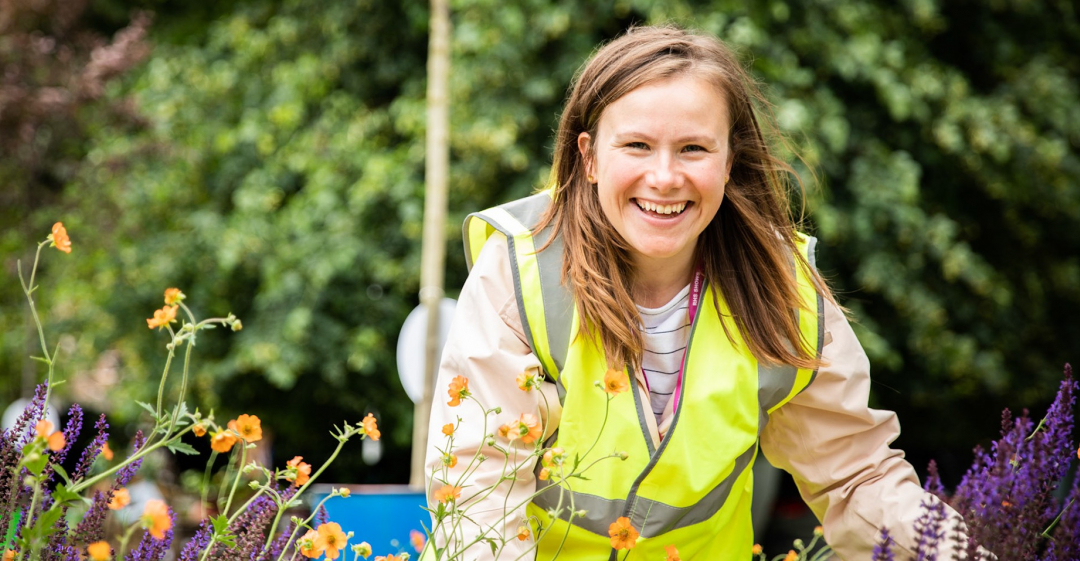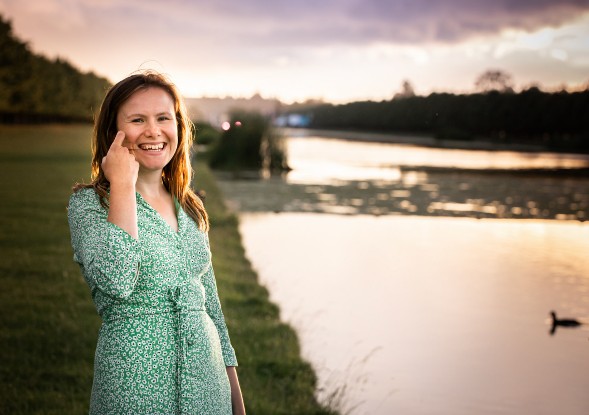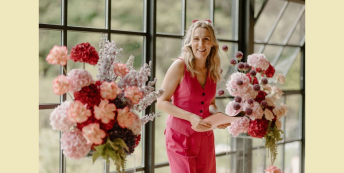“I felt empty and unfulfilled inside.”

Newly Updated
What work were you doing previously?
I was a social researcher.
I fell into the work after finishing my Master's in educational psychology.
What are you doing now?
I'm now retraining and starting my own business as a garden designer.
How did you feel in your work before you decided to make the change?
I was stressed and unfulfilled.
I moved jobs in order to see if the problem was the company, rather than the work. I tried out three places before I had to accept that the work wasn't for me.
It wasn't that I couldn't do it – I knew I was good at it, all my bosses said so, and I was getting glowing reviews and promotions.
But I felt empty and unfulfilled inside.
I felt that there was something 'wrong' with me; 'society' was telling me I should be happy but I just wasn't. I took promotions because I thought I should, without questioning whether or not they were actually what I wanted.
Whilst the big wins and occasional days were good, the day to day wasn't for me. It just didn't pull me emotionally.
Why did you change?
Ultimately I was unhappy.
But also, I'd found something that did give me joy and more fulfilment.
I needed to create.
When was the moment you decided to make the change?
l wouldn't say there was one moment, but instead a series of little revelations over a period of three years.
These revelations both made me realise I was unhappy in my current profession, and made me believe a new life was possible.
One of the biggest moments was after the first major lockdown lifted last year. In September I took a much needed break from work. It was the first time I’d had two weeks off in around two years. During that time my husband and I were lucky enough to go to Scotland. We stayed in a cabin by a loch, hiking, canoeing and generally escaping from the pandemic pressure.
Being there away from it all gave me the perspective to see that I was unhappy and give me an idea that changing was actually possible.
How did you choose your new career?
A few years ago I got my first garden and fell properly in love with gardening.
I realised I loved being outside and doing things with plants. I also realised that my creativity wasn't being fully used in my current job, and that I needed to create to feel fulfilled.
I started to think that maybe I could do gardening as a job.
I decided that because I knew I liked gardening, I would try to get some work experience for that first. To do this, I compressed my hours at work into four days. I then applied to volunteer at a local heritage property to test out the realities of being a gardener on my 'day off'.
Here I met a fantastic group of professional and amateur gardeners, who were (and continue to be) generous with their time and knowledge.
I spoke to a few people in the Landscape Architecture profession who suggested I look into garden design. It looked amazing. However, I was nervous about leaving a well-paid, secure job for something less certain.
Would it be OK to earn less money? Would it be fair on my husband if I went back to study? I’d worked so hard on my career, was it really not what I wanted?
After a ponder, I parked the idea for a while. I’d recently got a promotion at work and wanted to give it my all to see how things panned out.
A few months later the pandemic hit. Being outside and connecting with nature took on an even more significant meaning for me. Growing things went from a passion to bordering on an obsession.
It wasn't till Scotland though, where I had time to think, that it all started to click together that gardening was something I had to try, and soon.
Are you happy with the change?
So far yes, 100%.
What do you miss and what don't you miss?
I miss some of the people I used to work with and the social aspects of being in a team.
Garden design, especially if you're freelance, can be quite a lonely profession. Over time, though, I hope to grow my business and collaborate, possibly employing others.
I don't miss the lack of freedom to make my own decisions about how and where I work. Nor do I miss working with numbers, writing long reports and having to read countless academic articles.
How did you go about making the shift?
After deciding this was something I wanted to do, I thoroughly researched how other people had got into the profession.
I learnt about the professional body, talked to people within the industry, and realised that I would need to go 'back to school' in order to have a comprehensive base to build from, to give myself the best chance.
How did you develop (or transfer) the skills you needed for your new role?
I signed up to garden design school in order to develop the subject specific knowledge and contacts I would need to have a good shot in a competitive industry.
My old career had given gave me analytical, organisational and people skills, which could directly transfer to this new work, but I realised I needed new training to have a comprehensive understanding of construction techniques, drawing, CAD, material sourcing, planting formations and design in order to be the best designer I could be.
How did you handle your finances to make your shift possible?
To be brutally honest I am fortunate.
I have a supportive husband who's in permanent, full-time work. Whilst we have modified our lifestyle to manage on one income, this provides some financial stability to the finances.
I'm also fortunate that I had the capital to pay the course fees and set-up costs, from a mix of lockdown savings and an inheritance I got from my grandparents.
If I hadn't had this lump sum, I would have still gone ahead, but with a more restricted choice of courses (garden design school is expensive). I would also have tried to remain working 2-3 days a week and done a course part-time over 2-3 years, rather than one year full-time. That was how I'd done my MSc in Educational Psychology.
What was the most difficult thing about changing?
It sounds corny, but the most difficult thing was making the decision to leave, and admitting I wasn't a failure for doing so.
I would only have failed if I had stayed, as I would have been letting myself down.
What help did you get?
I've had so much support from my partner, friends and family to make this possible.
My parents, in-laws and husband all helped and pitched in to help me build an exhibit at RHS Hampton Court Palace show this year. I couldn't have done it without their help and support.
Friends and family have offered garden spaces for me to practise with and trial out. The work I'm doing for them has helped me get noticed by their friends and other family, which is chargeable.
I also joined the professional network for Garden Design, the Society of Garden Designers, which has started to open up opportunities and build contacts within the industry.
What resources would you recommend to others?
For garden design, the Society of Garden Designers website has course recommendations.
I'd also recommend going to open days and talking to more than one active professional to understand the nitty gritty of the day-to-day reality.
Shadow someone if you can, and try more than one thing out.
What have you learnt in the process?
That I have more control over my life than I had thought.
That change is less scary once I'm actually doing it.
That I'm more capable than I'd realised.
That if I feel something is wrong, it usually is. I've learnt to trust my gut – it's there for a reason.
That I will learn through making mistakes.
What would you advise others to do in the same situation?
Find something that sparks joy for you and explore it.
Take your time to really get to know yourself in order to be confident in your decision.
Talk to people in the industry, get work experience, or volunteer if you can, in order to understand the day-to-day reality before taking the plunge. You never know where it may lead.
In terms of wrong turns and things not going well, I'd say be prepared for either feast or famine in the business.
Build up financial reserves and have a back-up plan (for example I know I can pick up odd hours gardening if I need to).
And go for it. If your gut is saying your current thing isn't for you, it isn't.
We caught up with Zoe recently to see how her shift was working out, roughly two years on. Here's what she's been up to, and the biggest lessons she's learned.

What's changed for you in your career since we first published your story?
A lot.
I’ve graduated from both design school and horticultural college, set up a business, had my first batch of paid design and to top it off exhibited a show garden for the Wildlife Trusts at RHS Hampton Court last year.
This project was a success raising the awareness and importance of rented gardens for mental health and biodiversity. Amongst a lot of press and online coverage, I won three awards and I was featured on Gardener's World (Episode 16).
For championing these forgotten gardens I was also named one of the RHS's horticultural heroes of 2023.
How do you feel about your work now?
I’m much happier about life in general and feel more in control.
I like the fact that every day I wake up to bring people and plants together so that no matter what I do it feels congruent with my values. Some tasks are boring in a job (you'll never like it all), but overall because my purpose is aligned I’m more at peace.
That doesn't mean I don't have stressful days sometimes or feel out of my depth, I do, but I’m feeling much happier and more fulfilled. This has positively impacted the rest of my life.
What challenges have you come up against since making your shift, and how exactly have you dealt with them?
The two biggest challenges for me have been financial stability, and loneliness.
Working for yourself from home is lonely. Whilst installation days and clients days are great, the remainder of the time I'm in a room with myself which sometimes isn't much fun.
Financial stability is also a challenge in this industry with many people chasing comparatively few well paid jobs and a lot of freelance work. To solve both I’ve recently started working a couple of days a week for an established designer up in West London.
This was originally a short contract but we're extending it as I'm learning a lot and it’s great to be part of a team again and get into the office.
It’s also providing me with a financial base to then be able to take a breather, and grow my own work over the other days in a more sustainable way. Taking my time a bit more than I have been.
How is the financial side of things panning out, and is this what you'd expected?
I was told from the off by veterans in the industry that this would be a five-year journey to build a stable garden design business, and they weren't wrong.
Gardens take time to grow and people want to see proof you can do it / that it’s worth the investment before hiring you, so as someone new the first load of commissions are a bit like chicken and egg.
This business is all about referrals. Hopefully my first batch of gardens will start to photograph well from next year. So in the interim I'm in the position I expected to be in but it doesn't make it any less challenging sometimes.
When big names tell me it took them three-five years to more or less break even (let alone make profit) I knew this was a steep mountain. Hence why working for someone part time is a great step for me and is where I sort of expected to go for a while.
What have you learned, since making your shift?
A lot but I still feel like I've only scratched the surface about gardens, design, business, horticulture, landscaping and architecture.
I’ve also learnt I’m more capable than I think I am, and the show garden in particular gave me a lot more confidence in myself.
Is there anything else you'd like to share?
Whilst I’m financially not as well off, I’m happier and healthier on every other metric.
I’m pleased I made the jump and have never regretted it. We only have one life, so doing something which gives me meaning and engages me is really the only way to go for fulfillment.
To find out more about Zoe's services, visit https://www.zoeclaymore.com/.
What lessons could you take from Zoe's story to use in your own career change? Let us know in the comments below.



